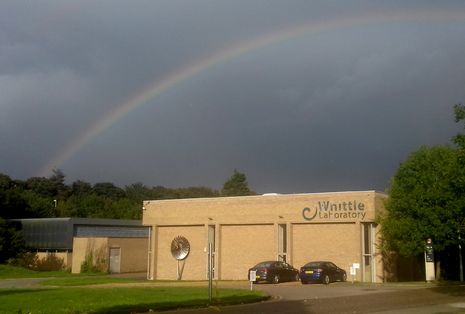‘Genius’ engineers vs the climate crisis: Do they stand a chance?
“The work of engineers is key to the fight against the climate crisis,” argues Grace Blackshaw, “but technology alone is not enough.”

Last week, Prince Charles visited the University of Cambridge’s Whittle Laboratory to launch the new National Centre for Propulsion and Power. There, he asked engineers to use their "genius" to help decarbonise the aviation industry.
The Whittle Laboratory was opened in 1973 by Sir Frank Whittle, inventor of the turbojet engine, with the original aim of bringing air travel to the masses. It is partnered with Rolls-Royce and Mitsubishi Heavy Industries, neither of which has historically been best known for their green credentials. It is then perhaps an usual setting for the latest call to action on the climate crisis.
The focus of the visit was the laboratory’s work on zero-carbon planes. Led my Professor Rob Miller, the laboratory is working on fully electrifying small and medium-sized aircrafts and dramatically reducing the carbon emissions of larger aircrafts.
They have also been looking at the design process itself. Using machine-learning design systems, graphics from the gaming industry and rows of 3D-printers, the process of developing new technologies can be 10 times faster and cheaper than traditional approaches. At the Whittle laboratory, the emphasis very much appears to be on coming up with new engineering solutions as quickly as possible.
Other research in the department takes a different approach. November last year saw the release of ‘Absolute Zero’. The work of a group of academics across six UK universities, it aims to act as a guide to ‘delivering the UK’s climate change commitment’. The group is led by Julian Allwood, Professor of Engineering and the Environment at the University of Cambridge.
In contrast to the mood at the royal visit, the report argues that we cannot afford to rely on new technological developments that may or may not be ready in 30 years-time. For too long, governments and industry have been quick to put their faith in revolutionary, breakthrough technologies that would allow for uninterrupted economic growth and very few lifestyle changes.
Instead, ‘Absolute Zero’ argues that we should be focusing on incremental technologies, which it defines as technologies that could be delivered today if consumer demand was there. Their report suggests that by 2050, non-emitting electricity generation should have trebled, we should only be using recycled steel, eating mainly vegetarian diets, travelling largely by electric trains and there should be no commercial flights.
These changes need not all be permanent. The report acknowledges that electric flights are likely to play a role in any longer-term solutions but argues that we cannot assume the technology will be ready in time to play a significant role before 2050.
Cement presents another considerable challenge to achieving ‘absolute zero’ by 2050. Cement production releases emissions even when powered by electricity from non-emitting sources but we can’t currently build the infrastructure we need without it.
Elsewhere in the engineering department, Professor Abir Al-Tabbaa is working to change this.
A geotechnical engineer by training, Professor Al-Tabba is working on what she describes as "infrastructure materials, across the whole range from stabilised soils to cement to mortar to concrete." Her work focuses on "sustainability, durability and resilience."
Recently this has included self-healing concrete. Tiny capsules filled with healing agent are added to the concrete. Cracks rupture the capsules and release the healing agent. She is has also worked on low carbon alternatives to concrete and new materials for carbon capture and storage.
Speaking about the impact of her work on the climate crisis, Professor Al-Tabbaa explains, "We’re trying to reduce the carbon footprint of these materials. You can do that in two ways: you can use low carbon materials in the first place or whatever you build you can make it last twice, three times as long."
Asked about the importance of contributions from academics, she responded, "I think it’s very important because we’re providing evidence for actual technologies and the performance of systems."
However, despite the contributions of numerous individual academics, there remains controversy about the university’s approach to the climate crisis. In November last year, the university launched their ‘Cambridge Zero’ initiative, whose remit includes the work of the new National Centre for Propulsion and Power. Student groups such as ‘Zero Carbon’ claim that this is a PR stunt, the latest in a long line of attempts by the university to ‘green-wash’ their involvement in the fossil fuel industry.
Speaking of PR, it is all very well for Prince Charles to give speeches about saving our ‘poor old planet’ but when he travels to the event in a private helicopter and then a Bentley, how seriously can we really take his message?
Don’t get me wrong, the work of engineers is key to the fight against the climate crisis, but technology alone is not enough. As tempting as it is to sit back and wait for the engineers to come up with the solutions to save our planet, this is simply not good enough. Electric planes are great in theory but fewer flights is still the best way to reduce our emissions.
 News / Judge Business School advisor resigns over Epstein and Andrew links18 February 2026
News / Judge Business School advisor resigns over Epstein and Andrew links18 February 2026 News / Gov grants £36m to Cambridge supercomputer17 February 2026
News / Gov grants £36m to Cambridge supercomputer17 February 2026 News / Hundreds of Cambridge academics demand vote on fate of vet course20 February 2026
News / Hundreds of Cambridge academics demand vote on fate of vet course20 February 2026 News / CUCA members attend Reform rally in London20 February 2026
News / CUCA members attend Reform rally in London20 February 2026 News / Union speakers condemn ‘hateful’ Katie Hopkins speech14 February 2026
News / Union speakers condemn ‘hateful’ Katie Hopkins speech14 February 2026










